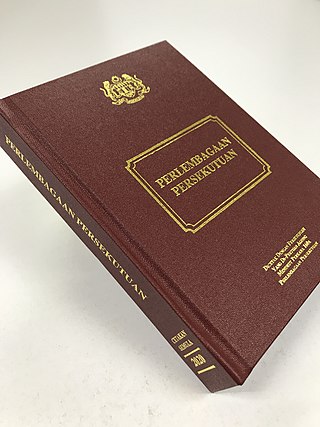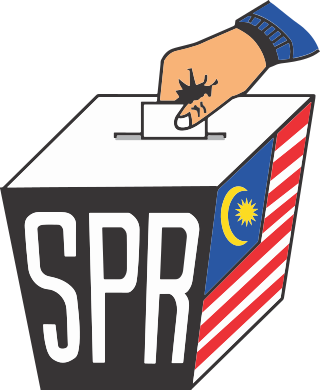Related Research Articles

The Federal Constitution of Malaysia, which came into force in 1957 as the Constitution of the Federation of Malaya and was amended in 1963 to form the Constitution of Malaysia, is the supreme law of Malaysia and contains a total of 183 articles. It is a written legal document influenced by two previous documents, the Federation of Malaya Agreement 1948 and the Independence Constitution of 1957. The Federation was initially called the Federation of Malaya and it adopted its present name, Malaysia, when the states of Sabah, Sarawak and Singapore became part of the Federation. The Constitution establishes the Federation as a constitutional monarchy, having the Yang di-Pertuan Agong as the Head of State with largely ceremonial roles. It provides for the establishment and organisation of three main branches of the government: the bicameral legislative branch called the Parliament, which consists of the House of Representatives and the Senate ; the executive branch led by the Prime Minister and his Cabinet Ministers and the judicial branch headed by the Federal Court.

Elections in Barbados are held to choose members to fill elective offices in the House of Assembly. Elections are held on Election Day. These general elections do not have fixed dates, but must be called within five years of the opening of parliament following the last election. A former minister of the DLP, Warwick Franklin summed up the general elections process in Barbados as saying it is really just, "30 by-elections on the same day."
Elections in Malaysia include elections to public office of the political entities that since 1963 have composed the federation of Malaysia. At present, elections in Malaysia exist at two levels: federal level and state level. Federal level elections are those for membership in the Dewan Rakyat, the lower house of Parliament, while state level elections are for membership in the various State Legislative Assemblies. The heads of executive branch at both the federal and state levels, the Prime Minister and Menteri Besar/Chief Ministers respectively, are usually indirectly elected, filled by a member of the majority party/coalition in the respective legislatures.

In various parliamentary systems, a returning officer is responsible for overseeing elections in one or more constituencies.

The Representation of the People Act 1948 was an Act of the Parliament of the United Kingdom that altered the law relating to parliamentary and local elections. It is noteworthy for abolishing plural voting for parliamentary elections, including by the abolition of the twelve separate university constituencies; and for again increasing the number of members overall, in this case to 613.

General elections in Singapore must be held within three months after five years have elapsed from the date of the first sitting of a particular Parliament of Singapore, as per the Constitution. However, Parliament can also be dissolved and a general election called at the behest of the Prime Minister before the five-year period elapses. The number of constituencies or electoral divisions is not permanently fixed by law, but is declared by the Prime Minister prior to each general election pursuant to the Parliamentary Elections Act, which governs the conduct of elections to Parliament, taking into account recommendations of the Electoral Boundaries Review Committee.

The Election Commission of Malaysia, abbreviated SPR or EC, is a commission set up for ensuring fair and equitable operations in undertaking the elections in Malaysia. The agency falls under the purview of the Prime Minister's Department.

The Electoral Administration Act 2006 is an act of the Parliament of the United Kingdom, passed on 11 July 2006.

The Elections Department of Singapore (ELD), known exonymously as the Elections Department, is a department under the Prime Minister's Office (PMO) of the Government of Singapore which are responsible for overseeing the procedure for elections in Singapore, including parliamentary elections, presidential elections and referendums.
There are five types of elections in the United Kingdom: elections to the House of Commons of the United Kingdom, elections to devolved parliaments and assemblies, local elections, mayoral elections, and police and crime commissioner elections. Within each of those categories, there may also be by-elections. Elections are held on Election Day, which is conventionally a Thursday, and under the provisions of the Dissolution and Calling of Parliament Act 2022 the timing of general elections can be held at the discretion of the prime minister during any five-year period. All other types of elections are held after fixed periods, though early elections to the devolved assemblies and parliaments can occur in certain situations. The five electoral systems used are: the single member plurality system (first-past-the-post), the multi-member plurality, the single transferable vote, the additional member system, and the supplementary vote.

The Electoral Registration and Administration Act 2013 is an Act of the Parliament of the United Kingdom which amended electoral law in the United Kingdom. It introduced Individual Electoral Registration (IER).
The Election Offences Act 1954 is a Malaysian law which enacted to prevent electoral offences and corrupt and illegal practices at elections; to provide for the establishment of enforcement teams and for matters connected therewith; to provide for the appointment of election agents and to control election expenses; and to provide for election petitions.

Kota Kinabalu is a federal constituency in West Coast Division, Sabah, Malaysia, that has been represented in the Dewan Rakyat from 1971 to 1974, from 2004 to present.

Kimanis is a federal constituency in West Coast and Interior divisions, Sabah, Malaysia, that has been represented in the Dewan Rakyat from 1971 to 1995 and again from 2004 to present.

Raub is a federal constituency in Raub District, Pahang, Malaysia, that has been represented in the Dewan Rakyat since 1959.

Temerloh is a federal constituency in Temerloh District, Pahang, Malaysia, that has been represented in the Dewan Rakyat since 1959.

Tuaran is a federal constituency in West Coast Division, Sabah, Malaysia, that has been represented in the Dewan Rakyat since 1971.

Sandakan is a federal constituency in Sandakan Division, Sabah, Malaysia, that has been represented in the Dewan Rakyat since 1971.

Kinabatangan is a federal constituency in Sandakan Division, Sabah, Malaysia, that has been represented in the Dewan Rakyat since 1971.

Tawau is a federal constituency in Tawau Division, Sabah, Malaysia, that has been represented in the Dewan Rakyat since 1971.
References
- Po Jen Yap (ed). Judicial Review of Elections in Asia. (Routledge Studies in Asian Law). Routledge. 2016. pp 58 & 62.
- Christian Schafferer (ed). Election Campaigning in East and Southeast Asia. Ashgate. 2006. pp 55, 61, 73 & 74.